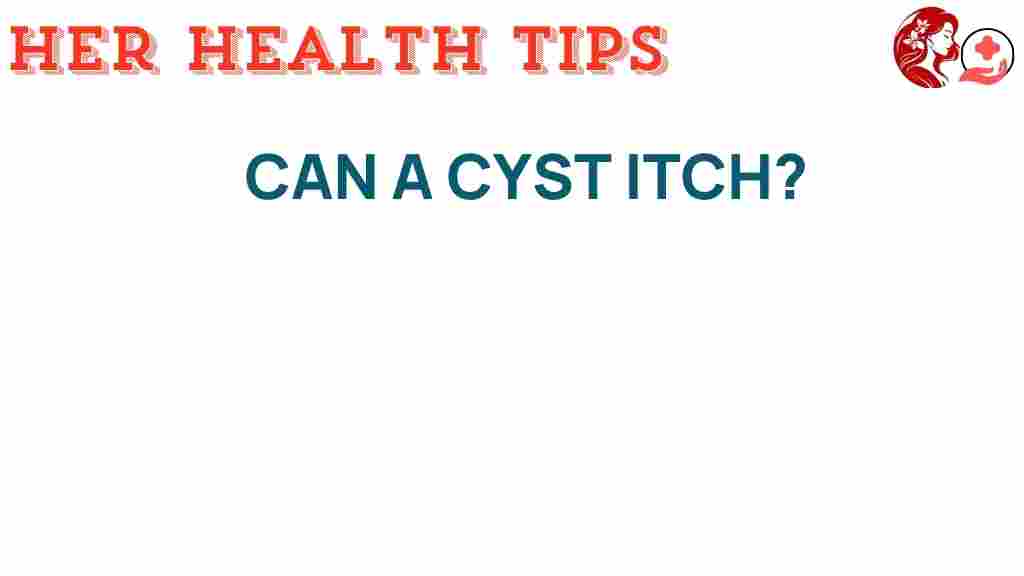The Itch Factor: Understanding Cysts and Their Sensations
Cysts are common skin conditions that can cause discomfort and concern. They often lead to various sensations, including itching, which can be bothersome for many individuals. In this article, we will explore the nature of cysts, their symptoms, and the relationship between cysts and skin health. We will also discuss diagnosis, treatment options, and patient care strategies that can enhance your wellness journey.
What Are Cysts?
A cyst is a closed sac-like structure filled with fluid, semi-solid material, or gas that forms in the body’s tissues. Cysts can develop in any part of the body, including the skin, and they come in various types. The most common type of cyst found on the skin is an epidermoid cyst, which is often benign and can be removed if desired.
Common Types of Skin Cysts
- Epidermoid Cysts: These are often small, round, and filled with keratin. They commonly appear on the face, neck, and trunk.
- Pilar Cysts: Usually found on the scalp, these cysts are similar to epidermoid cysts but are filled with a thicker substance.
- Steatocystomas: These are sebaceous cysts that contain sebum, a substance produced by oil glands, often found on the chest or upper arms.
- Dermoid Cysts: These can contain hair, skin, and sometimes teeth, and are often present from birth.
Symptoms of Cysts
Cysts can vary in size and appearance, and they may or may not cause symptoms. Common symptoms associated with cysts include:
- Visible lump: A raised area on the skin that may feel firm or soft.
- Itching: Some cysts can cause an itchy sensation, especially if they become inflamed or infected.
- Redness and swelling: Inflammation can occur around the cyst, making it appear red and swollen.
- Pain or tenderness: If a cyst becomes infected, it may become painful and tender to the touch.
The Connection Between Cysts and Itching
Itching associated with cysts can be due to several factors:
- Inflammation: When a cyst becomes inflamed, it can trigger the itch response in the surrounding skin.
- Infection: An infected cyst can lead to increased irritation and itching as the immune system responds to the infection.
- Pressure on surrounding tissues: As cysts grow, they may press against nearby nerves and skin, leading to sensations of itching.
Skin Health and Cysts
Maintaining skin health is vital not just for aesthetic reasons but also for overall wellness. Cysts can be a sign of underlying health issues or skin conditions, so it’s essential to monitor changes. Here are some tips for maintaining skin health:
- Hydration: Drink plenty of water to keep your skin hydrated.
- Moisturization: Use a good moisturizer to keep the skin barrier intact.
- Sun Protection: Apply sunscreen regularly to protect against UV damage.
- Healthy Diet: Consume a balanced diet rich in vitamins and minerals that promote skin health.
Diagnosis of Cysts
If you notice a cyst or experience symptoms such as itching or pain, it’s important to seek a professional diagnosis. Dermatologists are specialists in skin health and can provide a thorough evaluation. The diagnosis process typically involves:
- Physical Examination: The dermatologist will inspect the cyst and surrounding skin.
- Medical History: Discussing any previous skin issues, family history, and overall health.
- Imaging Tests: In some cases, ultrasound or other imaging tests may be necessary to assess the cyst.
- Biopsy: If there’s concern about the nature of the cyst, a biopsy may be performed to rule out cancerous changes.
Treatment Options for Cysts
Treatment for cysts may not always be necessary, especially if they are asymptomatic. However, if a cyst is causing discomfort or other issues, several treatment options are available:
- Observation: If the cyst is not causing problems, a doctor may recommend simply monitoring it.
- Medication: Antibiotics may be prescribed if the cyst is infected.
- Drainage: A healthcare provider may drain the cyst to relieve pressure and discomfort.
- Surgical Removal: For persistent or bothersome cysts, a minor surgical procedure may be performed to remove it completely.
Patient Care and Wellness
Effective patient care is crucial for managing cysts and ensuring overall wellness. Here are some strategies to consider:
- Follow-Up Appointments: Regular check-ups with your dermatologist can help monitor any changes in your skin health.
- Self-Care: Maintain a healthy skincare routine to minimize irritation and support skin healing.
- Educate Yourself: Learn about skin conditions and treatment options to make informed decisions about your care.
- Support Networks: Joining support groups can provide emotional support and practical advice from others dealing with similar issues.
Troubleshooting Tips for Itchy Cysts
If you experience itching from a cyst, consider the following troubleshooting tips:
- Avoid Scratching: Scratching can worsen irritation and lead to infection.
- Apply Cold Compresses: A cold compress can help reduce inflammation and soothe itching.
- Use Antihistamines: Over-the-counter antihistamines may alleviate itching if it’s related to an allergic reaction.
- Maintain Cleanliness: Keep the area around the cyst clean to prevent infection.
Conclusion
Understanding cysts and their sensations, including itching, is essential for maintaining skin health. By recognizing the symptoms and knowing when to seek a diagnosis, you can effectively manage these common skin conditions. With appropriate treatment and patient care, you can enhance your overall wellness and address any concerns related to cysts. If you have further questions or concerns, consider reaching out to a healthcare professional or visiting a dermatology clinic for personalized advice.
For more information about skin health and dermatology, you can visit The American Academy of Dermatology for resources and support. Additionally, if you’re looking for wellness tips, check out our article on Holistic Approaches to Skin Care.
This article is in the category Conditions and created by HerHealthTips Team
